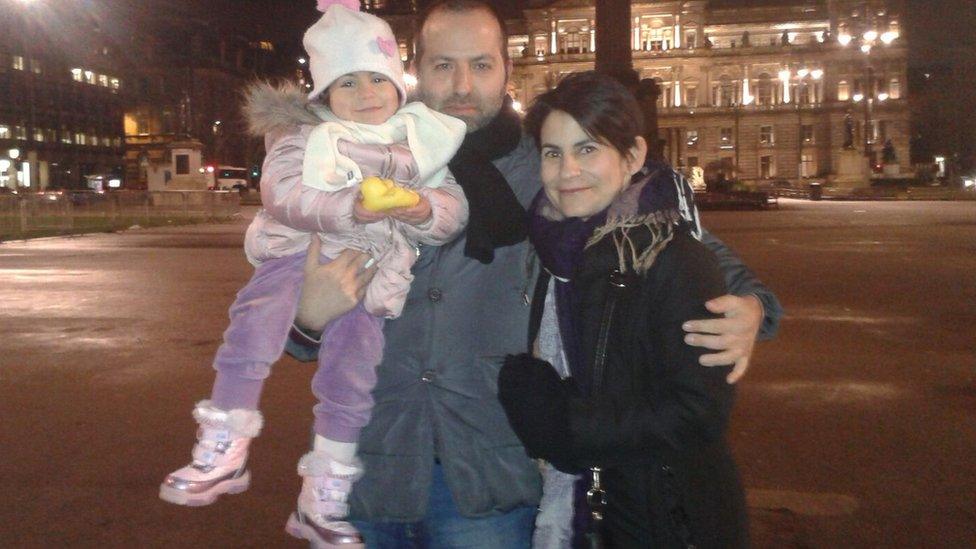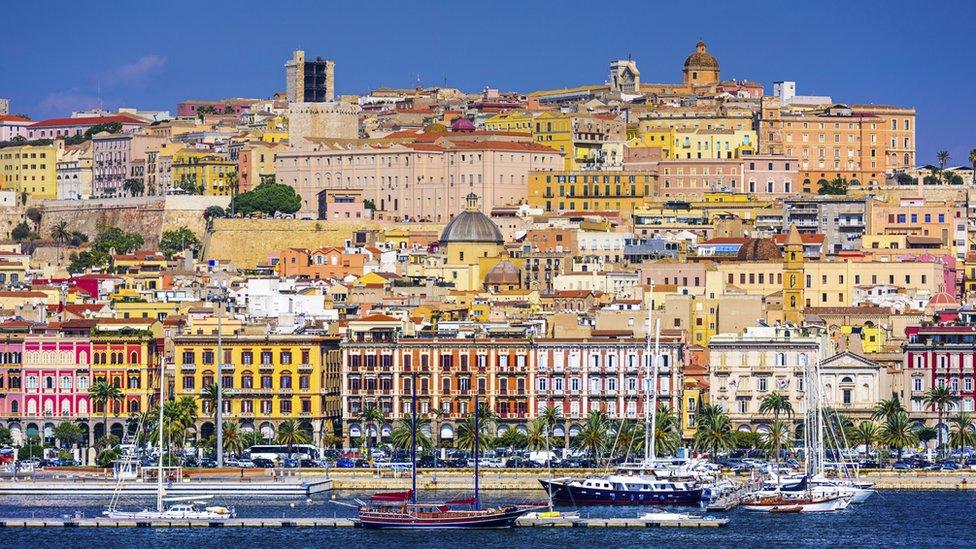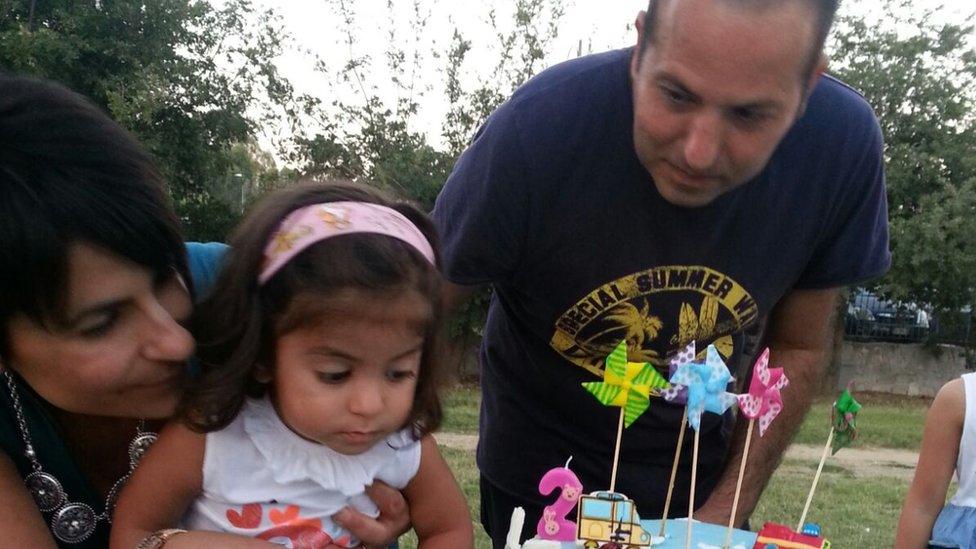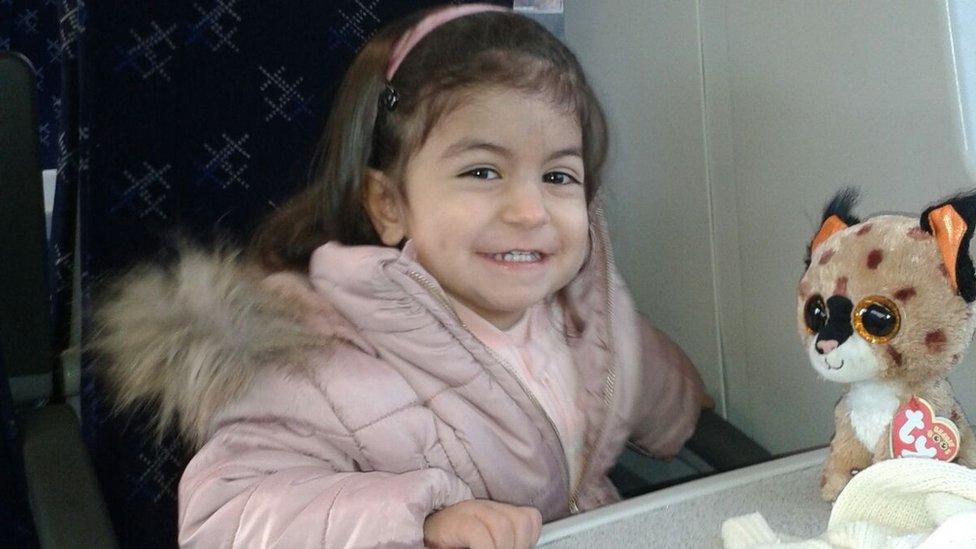From Sardinia to Scotland: A new wave of Italian immigration
- Published

Stefano Setzu and Manuela Cipollina and their daughter Rebecca moved to Glasgow last month
The Italian community is one of the most prominent and best-integrated in Scotland.
There are not many towns and few sections of society left untouched by a first wave of immigration in the late 19th and early 20th Century.
Names like Nardini, Capaldi, Nutini and Paolozzi have been woven into the tartan tale of the nation.
But now, it would appear, a new influx of residents of the Bel Paese is heading north to find a home.
High levels of youth unemployment - particularly in the south of Italy - have been blamed for this latest exodus.
They are following in the footsteps of men like my own grandfather who left behind a house in the Tuscan hills for the cooler climes of Glasgow in the 1930s.
Among their number are Stefano Setzu and Manuela Cipollina and their two-year-old daughter Rebecca who left Cagliari in Sardinia last month to come to Scotland.

The climate in Cagliari is a little different to what they have encountered in Scotland
They, too, have ended up in Glasgow in the hope of starting a new life, having both been left without work in their early 40s.
"In Italy at 41 years of age you are cut out of the world of work," explained Manuela.
"There are no incentives for employers to take you on. They tell you you are too old and you cost too much.
"If you want to learn a new profession, nobody will teach you.
"And unless you have a big amount of capital of your own to open a business, there is no help available."
Like so many of the earlier Italian immigrants, it was word of mouth which tempted them to Glasgow.

The couple said it was almost impossible for them to get a job in Sardinia
"We had a friend in Scotland who had come over who told us you could live well and there was plenty of work," she added.
"So with a two-year-old child we asked ourselves - both as a couple and for our daughter - what kind of future could we offer in Sardinia?
"The answer was that in Sardinia - the way things are at the moment in the current economic situation - we could offer nothing."
So they began to have a look at what prospects were like further north in Europe.
"I got a bit of information - I had a look on the internet about Scotland and I have to say that - much to my surprise - I only found good things," said Stefano.
"So with the money we had saved we decided to invest in a country which could give us something back - maybe not an El Dorado - but that could at least give us a chance to get back on our feet."
'Very helpful'
They arrived in January but said the notorious Scottish weather had not put them off.
"We have settled in straight away which we did not expect," he said.
"The weather hasn't been a problem - we even went out when it was raining, a thing we would never have done in Cagliari.
"Here it seemed the most natural thing in the world, we went out with our daughter in the rain and met people.
"And we were able to confirm what they say about Scottish people - they have been very helpful and have given us a hand in many different ways."
Back in Italy, they could not afford to buy a house together and so were living with their respective mothers.

The couple hope to offer a better future to their daughter in Scotland than the one they could in Italy
In Scotland, they hope to find the money to get married and build a new future.
Stefano's last job was in graphic design while Manuela has worked in a number of short-term posts but now hopes she can find a position which allows her to use her passion for making pastries.
One of Scotland's many Italian restaurants and cafes could be their first port of call but they say they are determined to make a success of their new life after leaving family and friends behind.
Stefano's words have echoes of many who left his homeland a century or more ago.
"Our plan was to leave and not go back," he said.
"Going back, for us, would feel like failure, to tell you the truth.
"If we went back we would find ourselves in exactly the same position as when we left, if not even worse."
Scotland has long welcomed their countrymen and now Stefano, Manuela and Rebecca hope it will be their home for years to come.
- Published26 September 2012

- Published21 September 2012
